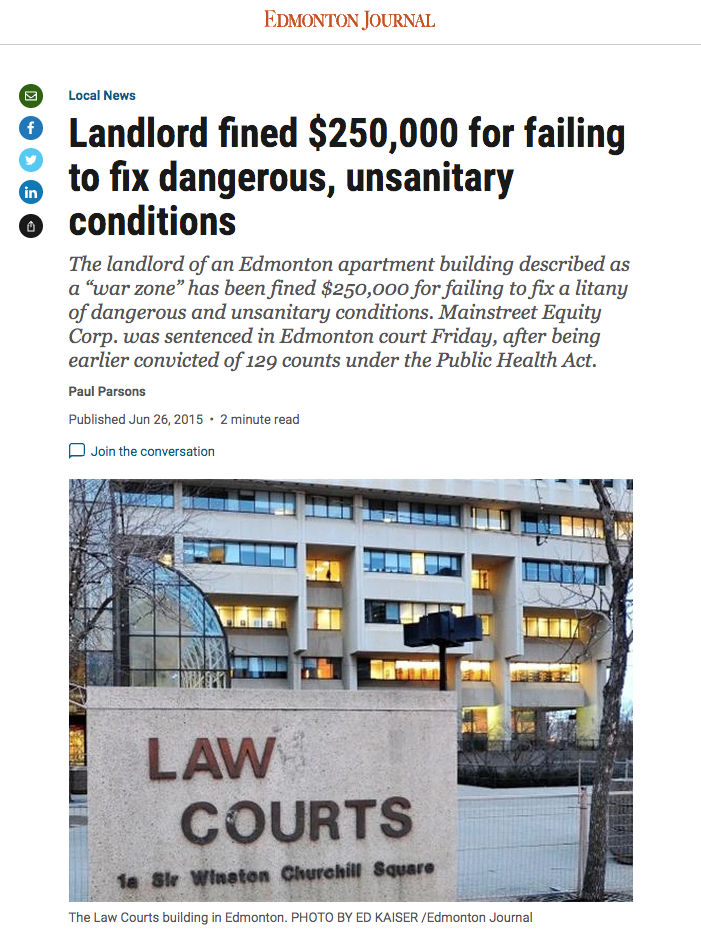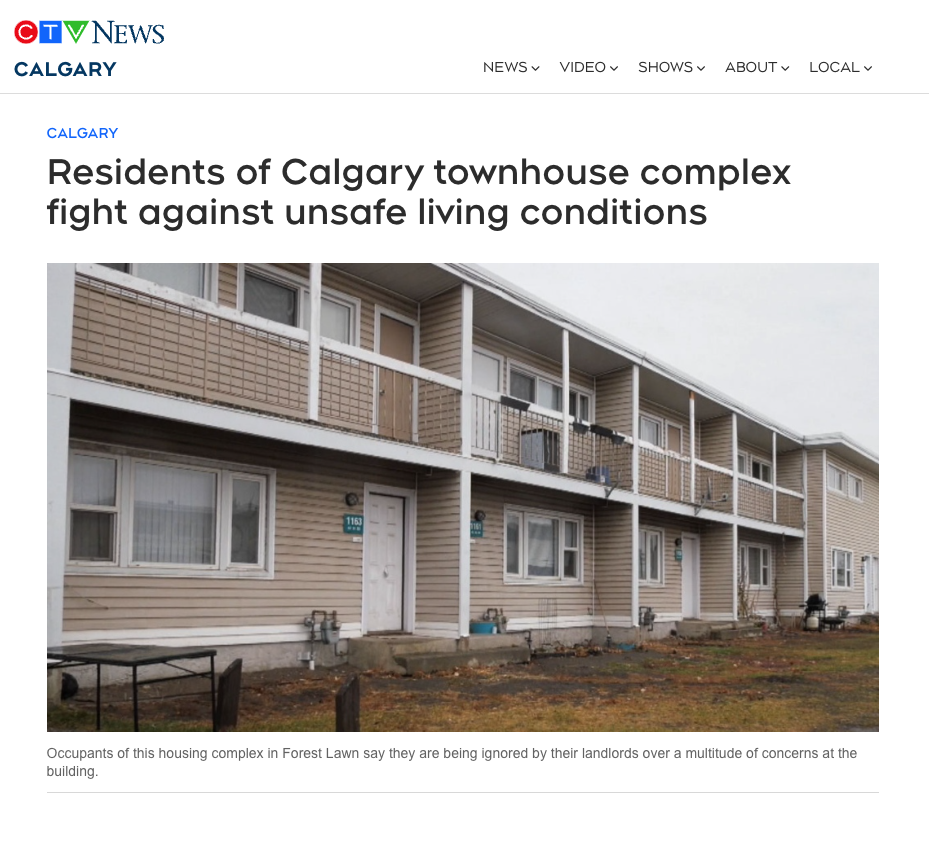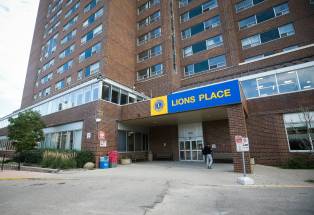Suspected buyer of Lions Place known for hiking rent, failing to conduct repairs
Read this article for free:
or
Already have an account? Log in here »
To continue reading, please subscribe:
Monthly Digital Subscription
$0 for the first 4 weeks*
- Enjoy unlimited reading on winnipegfreepress.com
- Read the E-Edition, our digital replica newspaper
- Access News Break, our award-winning app
- Play interactive puzzles
*No charge for 4 weeks then price increases to the regular rate of $19.00 plus GST every four weeks. Offer available to new and qualified returning subscribers only. Cancel any time.
Monthly Digital Subscription
$4.75/week*
- Enjoy unlimited reading on winnipegfreepress.com
- Read the E-Edition, our digital replica newspaper
- Access News Break, our award-winning app
- Play interactive puzzles
*Billed as $19 plus GST every four weeks. Cancel any time.
To continue reading, please subscribe:
Add Free Press access to your Brandon Sun subscription for only an additional
$1 for the first 4 weeks*
*Your next subscription payment will increase by $1.00 and you will be charged $16.99 plus GST for four weeks. After four weeks, your payment will increase to $23.99 plus GST every four weeks.
Read unlimited articles for free today:
or
Already have an account? Log in here »
Hey there, time traveller!
This article was published 11/01/2023 (1061 days ago), so information in it may no longer be current.
An Alberta company believed to be purchasing the 287-unit non-profit Lions Place housing complex in Winnipeg has a history of hiking rents and mismanaging its properties.
While Mainstreet Equity Corp. of Calgary has received glowing reports in the financial press for healthy growth, it has also garnered negative publicity for its rental units being unhealthy places in which to live.
“Unfortunately it has been the experience of Alberta members… that when Mainstreet takes over a property, they have a tendency to raise rents quite substantially with little to no explanation,” said Fable Dowling of the Association of Community Organizations for Reform Now, who lives in Calgary.

The company did not respond to repeated requests for comment this week. In its fourth-quarter investor presentation, Mainstreet listed the acquisition of a 287-unit in Winnipeg for $24,050,000.
Lions Housing Centres has not named the Lions Place buyer, but said it’s an Alberta firm and described Mainstreet’s business model verbatim: it “buys distressed older mid-market buildings and upgrades them with new sustainability features and smart-home technology.” It has 16,512 units in Western Canada.
In 2015, the Edmonton Journal reported that Mainstreet Equity was fined $250,000 for failing to fix a litany of dangerous and unsanitary conditions at a building it had acquired three years earlier. Mainstreet Equity was convicted of 129 counts under the Public Health Act.
Alberta Health Services repeatedly ordered Mainstreet to clean up and conduct repairs at the Edmonton building after inspectors, in July 2012, found the hallways strewn with clothes, shoes and garbage. A hole in the laundry room floor was filled with garbage, condoms and possibly fecal matter. Broken doors, windows, and problems with the stairs were also reported.
Suites at the Edmonton building had mice, bedbug and cockroach infestations. Of 23 suites, 10 were infested with cockroaches. There were also leaks and broken fixtures in bathrooms, unfinished ceilings and walls and mould. The health inspectors found the company’s efforts unsatisfactory, which led to the conviction.
“Housing should not be a commodity. It should be a right and we need to start treating it like that.”–Fable Dowling of the Association of Community Organizations for Reform Now
In B.C., Business in Vancouver reported in 2013 that tenants at a Mainstreet rental property in Surrey went without heat for two weeks. Although the landlord tried to fix the problem, it persisted.
In 2021, Calgary CTV News reported on a protest by tenants of a Mainstreet townhouse complex who said the company ignored heating, water and pest issues. The company was quoted as saying it had a 24-hour customer service line and the protesters had not brought the matter to its attention.
Dowling said Mainstreet has been blamed for unjustified rent increases at a number of properties it has acquired in Alberta.

“These increases are not really tied to inflation, even though that is what they’re saying. The vast majority of times when we see these rent increases, there’s not a corresponding increase in the quality of the maintenance or the quality of the service of the building. It really is just kind of a cash grab at a very vulnerable economic time,” Dowling said.
Dowling and other housing advocates say the growing “financialization” of residential rental units by real estate companies and real estate investment trusts is squeezing moderate- to lower-income apartment renters out of decent, affordable places to live.
“These corporate landlords are seeing an opportunity to make a significant amount of more money and they are jumping on that opportunity at the expense of very vulnerable people,” Dowling said.
“Housing should not be a commodity. It should be a right and we need to start treating it like that.”
Affordability down the drain
In Canada, for every new affordable housing unit created by public funding, 15 existing private affordable units were lost.
The statistic is included in a 2020 report by former Canada Mortgage and Housing Corp. policy analyst Steve Pomeroy.
The number of private rental units affordable to households that earn less than $30,000 per year (rents below $750) declined by 322,600 units from 2011 to 2016, says the report, which is titled “Why Canada needs a non-market rental acquisition strategy.”
In Canada, for every new affordable housing unit created by public funding, 15 existing private affordable units were lost.
The statistic is included in a 2020 report by former Canada Mortgage and Housing Corp. policy analyst Steve Pomeroy.
The number of private rental units affordable to households that earn less than $30,000 per year (rents below $750) declined by 322,600 units from 2011 to 2016, says the report, which is titled “Why Canada needs a non-market rental acquisition strategy.”
“These losses are driven chiefly by the financialization of rental housing – an asset class attracting investment from both large capital funds, as well as smaller investors, both seeking to capitalize on dramatically rising rents,” said Pomeroy’s Focus Consulting Inc. report. “A further contributor is the intensification and redevelopment of sites with older low-moderate rent properties.”
Winnipeg Liberal MP Dan Vandal said he is rankled by the loss of 287 affordable non-profit units at Lions Place in Winnipeg.
Vandal made the comment at a news conference on Wednesday to announce 69 new affordable housing units to be built downtown and owned by Opaskwayak Cree Nation of The Pas.
“Absolutely, it concerns me very much,” he said.
The MP said he wrote to the board of Lions Housing Centres in late 2022 to express concern about the sale and made it clear it should remain non-profit housing.
“I invited the board of directors to meet with me to talk about how we can work together to try to ensure that Lions Place stays as a non-profit, affordable housing. I never received a response.”
—Staff
When Lions Place was built downtown 40 years ago, public money was used, through the Canada Mortgage and Housing Corp., and the goal was to provide affordable housing for seniors.
Its sale to a for-profit company may be the “canary in the coal mine,” signalling what could happen to a number of non-profit buildings that have provincial operating agreements set to expire, said the executive director of the Manitoba Non-Profit Housing Association.
“There’s still is no clear plan for the province to deal with the end of operating agreements for a number of organizations that will be at serious financial risk in the next five to eight years if the government doesn’t announce anything,” said Christina Maes Nino.
The province’s operating agreement with Lions Place kept rents affordable, but it expired and wasn’t renewed.
Lions Housing Centres, which had paid off the $13.5-million mortgage on Lions Place, put the building up for sale to help fund its other non-profit housing complexes. Then it was sold.
Manitoba’s housing minister said Wednesday a plan is under consideration to prevent that scenario from being repeated.
“We are seriously looking at legislation that would change it so that future units coming off agreements in the years to come would not be in the same conundrum as Lions Place,” Rochelle Squires said Wednesday.
“It would be better to have a handle on this it at the outset, rather than coming at it after a sale has been completed.”
Squires repeated a promise she has made to seniors who live at Lions Place and are concerned about new owners raising the rent beyond their means.
“They won’t experience rent increases or be displaced form their homes because of a rent increase of any sort,” she insisted.
carol.sanders@freepress.mb.ca
Mainstreet Equity Corp Q4_2022

Our newsroom depends on a growing audience of readers to power our journalism. If you are not a paid reader, please consider becoming a subscriber.
Our newsroom depends on its audience of readers to power our journalism. Thank you for your support.
History
Updated on Thursday, January 12, 2023 9:26 AM CST: Minor copy fixes









